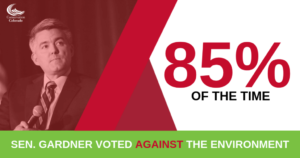I write as the enthusiastically wide-eyed recent addition to Conservation Colorado. My name is Koki Atcheson and I graduated from Colorado College this May with a BA in Environmental Science: Integrated and a minor in Education. I am so grateful to the Public Interest Fellowship Program and Conservation Colorado for this opportunity to start as a Communications Fellow.
I accepted a position in Colorado, far from my home base in Honolulu, Hawaii, because I recognize the state of Colorado as a national leader in advancing pro-environmental policies, public lands protections, renewable energy, and clean air and water for all people. I draw inspiration from Colorado’s green spaces of all sizes and the energy of city planners and community members working in partnership with nature. I see hope and great potential in the conservation movement, and I am eager to join a team who works relentlessly toward a better future for our environment and our people.
Once I walked through Conservation Colorado’s doors, I did not wait long to experience advocacy work firsthand. Moments after finding my desk, I listened in on a tele-press conference detailing Senator Cory Gardner’s voting history, and the implications of his anti-environmental votes. This was my introduction to what it means to hold elected officials accountable.
 Senator Gardner has failed to fulfill his advertised commitments to renewable energy and the environment. Between 2015 and 2018 he voted against the environment 85 percent of the time. This record does not honor the conservationist identity that I share with 69 percent of Coloradans.
Senator Gardner has failed to fulfill his advertised commitments to renewable energy and the environment. Between 2015 and 2018 he voted against the environment 85 percent of the time. This record does not honor the conservationist identity that I share with 69 percent of Coloradans.
Reading Conservation Colorado’s report of Senator Gardner’s voting history, I was most upset to see that he has made surface-level claims of pro-environmental beliefs without stepping up as a leader in climate policy, sponsoring a wilderness bill, or consistently voting to secure the best interests of Colorado’s people and environment. These findings reinforce the necessity of digging deeper than political candidates’ promotional materials, and making this information easily accessible.
In Colorado, pro-conservation elected officials accurately represent the values and needs of residents. Pro-conservation actions promote public health through policies that minimize displacement and pollution, and maximize green spaces for all. In this way they are a vehicle for justice, and can work to counteract centuries of environmental racism.
Senator Gardner has an immense opportunity to represent Coloradan values and leave a positive legacy for the state he serves through working to advance clean energy, fully sponsor conservation bills, and protect the wilderness areas that keep Colorado wild.
If Colorado hopes to remain a proud champion for our environment, all of our elected officials must step up and boldly pursue action that honors our state’s human and natural needs. In my time as a Communications Fellow at Conservation Colorado, I look forward to learning from a wealth of mentors who are doing the political work to sculpt an equitable, environmentally connected future.






